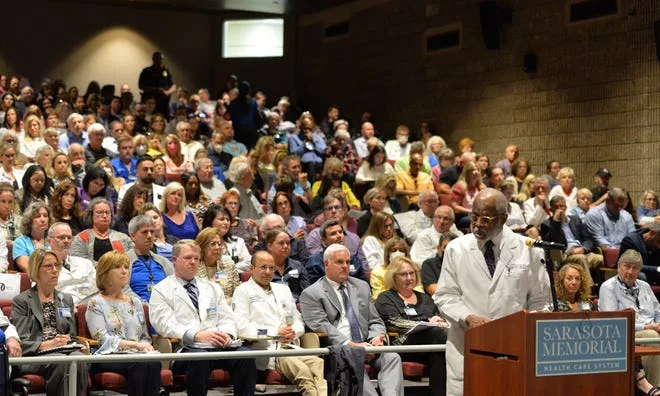
Local medical experts and advocates of maternal healthcare are setting the stage for a conversation about birthing disparities in Black and brown women and inviting the community to better understand how stark the disparities are during a panel discussion at this year’s Sarasota Film Festival.
The multi-day film festival kicks off on Friday with a wider selection of films this year that center on the lives of marginalized groups. This year’s African American Sidebar will feature more than a dozen films and documentaries that showcase stories of African Americans and the African diaspora, including Aftershock, a film about maternal birth disparities in Black women and the aftereffects of Black mothers dying during childbirth.
Washington Hill, founding director of maternal-fetal medicine at Sarasota Memorial Healthcare System, leads a nationally renowned team of physicians and neonatologists that serve expecting mothers and unborn children in the tri-county region.
For nearly 60 years, Hill has worked as an obstetrician and gynecologist caring for women before, during, and postpartum and has witnessed the stark disparities in maternal deaths and morality firsthand. Hill, and his team, have been sounding the alarm about the importance of equitable and accessible maternal healthcare. Now, they are using films like Aftershock to create a dialogue around what to do to lessen the disparity.

In the state of Florida, around 300 mothers die each year during or within 12 months of giving birth.
Hill and the Florida Maternal Morality Review Committee review each of those deaths annually to study and identify contributing factors to maternal deaths and to develop and share recommendations among medical practitioners.
“There’s a lot of effort that has been going on in our community, in the tri-county area, on decreasing the disparity and informing patients. Most importantly, we’ve started listening to patients better,” Hill said.
“In this film, you will see nurses, doctors, and healthcare workers did not spend as much time as they should have listening to the patient. If you’re a woman when you go into labor and delivery, when you go into your prenatal care, when you go into an OBGYN and you have a problem, you want them to hear you and not just dismiss you.”
The mortality rate for Black mothers was 69.9 deaths per 100,000 births in 2021, according to a report from the Centers for Disease Control and Prevention, about 2.6 times higher than for white mothers.
As part of the film screening, Hill will lead a panel discussion that will dive into the movie as well as the glaring disparity in the mortality rate of Black mothers. The Aftershock & The Health of Mothers panel is a community event and is free with registration. Other panelists include Dr. Haywood Brown, Professor, OB/GYN USF Health Morsani College of Medicine, and midwife Nakeisha Lindsay, who will offer expertise and insight into the healthcare disparity immediately following the film.
Related:Organizers announce the lineup for Visions of the Black Experience film Fest
Just ahead of the annual Black Maternal Health Week (April 11-17), the film and panel discussion are tangible ways community members are beginning to move toward healthier families and health equity Hill said.
“The flavor in the community is ‘What can we do to improve?’ and that’s why the panel is so important. What are we doing and how can we make care in this area better, for everybody? Whether it’s an immigrant from Guatemala or it’s the president’s wife. We have to continue to work,” he said.
“I’m not interested in regurgitating bad experiences at the hospital. What I’m interested in doing is making the care that is given to this community better. We do that by listening to the patient, making sure that we hear what she has to say; and by dealing with social determinants of health, by educating the staff we can do that.”
The free Sarasota Film Festival “Aftershock” & the Health of Mothers panel is happening at Ringling College Auditorium on Saturday, from 1 – 4 pm. Registration is required and attendees can register for attendance at the SFF website link https://www.sarasotafilmfestival.com/event/aftershock/.

